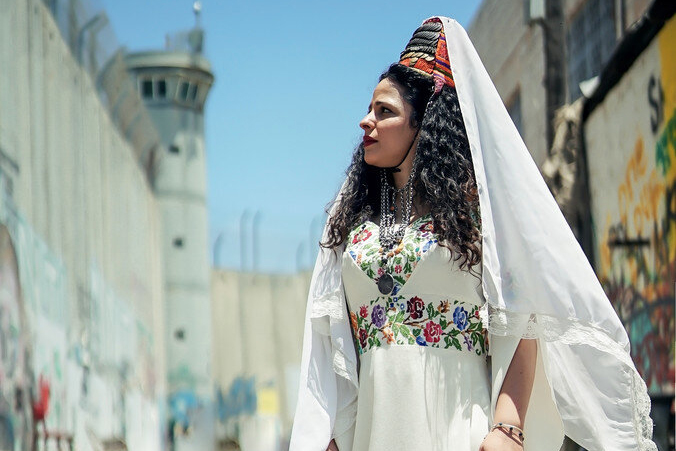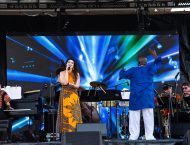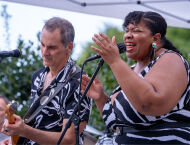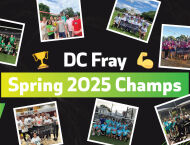Culture
 "The Bride Dress" directed by Marwah Jbara Tibi. Photo from dcpfaf.org.
"The Bride Dress" directed by Marwah Jbara Tibi. Photo from dcpfaf.org.
The DC Palestinian Film & Arts Festival Returns
November 3, 2021 @ 10:00am
Founded in 2011 by three women — Noura Erakat, Huda Asfour, and Nadia Daar — the DC Palestinian Film & Arts Festival showcases Palestinian culture from Palestine and the diaspora.
In its eleventh year, this fall’s lineup included a double-feature documentary, play, feature films, shorts and a discussion on the art of tatreez: Palestinian embroidery.
One theme that echoed throughout the films was love and border-crossing, with many works questioning: Can love cross man-made boundaries? Can boundaries prevent people from plying the craft they love? Could we come to take boundaries as so omnipresent that they are a part of our emotional milieu like love is?
In “200 Meters,” the opening feature film, a father is separated from his family by 200 meters and an unscalable wall. In a strange riff on “The Great Gatsby,” he says goodnight to his kids with a light show from his balcony. The film sets a somber tone for the slate of features to follow.
The “Fishless Sea” documents the challenge fishermen in Gaza face in sustaining this age-old tradition in the face of the borders erected during the occupation. It leaves us wondering, How can there be borders in something as boundless as Earth’s waters?
Under the Oslo Agreements, the fishing range for Palestinian fishermen was 20 nautical miles. Over the years, however, the Israeli military dramatically reduced this range simply by harassing and jailing anyone who dared to go past the seemingly arbitrary limit. For a brief period, Israel expanded the range to six miles, only to once again reduce it, ostensibly in response to missile fire coming from the strip.
The fishermen are not allowed to go further than 3-4 nautical miles and that very limited perimeter has them mired in depleted waters, where few sardines remain. Abu Alaa’, the patriarch, poignantly talks about taking out a bank loan so his oldest son can get married. Despite what is clearly economic violence, he and his family remain stoic in the face of it, with the past continuing to live in their hearts, albeit spoken of wistfully. “The sea is all they know,” he says, and he remains anchored there, despite the invisible but stark chains the state has placed in his path.
“The Bride Dress,” similarly, is the story of how checkpoints box something as intensely human as marriage in a checkmate. The film captures the journey of two Palestinian brides, Lubna and Sumoud, who share the same wedding dress and the same challenge of having their grooms there for their weddings. A political prisoner, Sumoud’s fiancé watches his engagement party on video from behind bars.
Lubna’s groom, denied an entry permit, has to be smuggled into Nazareth. What could be perhaps shocking to a Western audience is that this situation is not uncommon. Israel currently has a 18-year-old ban on family reunification, known as the Citizenship Law. The family reunification ban was passed in 2003 as a temporary security measure in the wake of the Palestinian uprising known as the second intifada. The law has been renewed every year since. This law keeps some married couples permanently apart. As one of the women in the documentary puts it, “It is easier for me to marry a foreigner than to marry someone from the West Bank or Gaza.” “This is sick, but what can we do?”
In both of these documentaries, we see very little overt pathos or polemics; it is almost as if the characters have internalized these borders and found a way to resist them by holding on to celebrations ever so staunchly and bravely. In a scene where Lubna tries on her wedding dress for the first time, her family invites her fiance Abdallah to take a selfie as it might be the only photo they may have from their wedding day if he is not able to come. Lubna’s mother reassures her with “I hope your groom will come, honey,” in a scene so poignant in its banality. Clearly, this is a fate that is felt by others, too.
Both of these documentaries also portray life in occupation in all its surprising normalcy. In The Bride Dress, we are treated to many scenes of the pre-wedding festivities, such as the dolma rolling party and the henna hand-painting, along with the singing of traditional songs. We see the bride and her family going through the same universal trepidations of leaving one’s family and starting on a new chapter of one’s life. The films offer such a rich, engrossing immersion of everyday life behind borders.
Though the festival was October 21-24, you can still stream the films on other platforms, and support the DCPFAF through volunteering and donating.
To learn more about the DC Palestinian Film & Arts Festival, visit dcpfaf.org. Follow the festival on Instagram @dcpfaf.
Enjoy this piece? Consider becoming a member for access to our premium digital content. Support local journalism and start your membership today.







